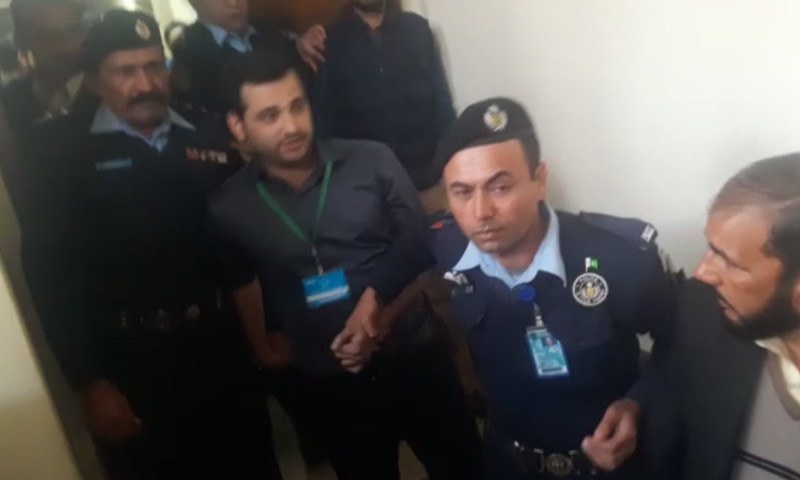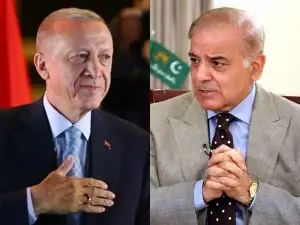ISLAMABAD – The Supreme Court on Thursday ordered the arrest of the main culprit, Shahrukh Jatoi, Sajjad Talpur and Siraj Talpur in Shahzeb Khan murder case.
All accused were taken into custody by the Islamabad police after the verdict was read out by the Chief Justice of Pakistan (CJP) Mian Saqib Nisar.
The apex court has directed the authorities to put their names on ECL. The top has also restored terror-related sections in the case.
The bench wondered how Sindh High Court (SHC) discarded the Supreme Court 2013 decision wherein it was mentioned that the case against Shahrukh Jatoi and accused should be conducted before an Anti-Terrorism Court (ATC).
A group of civil society activists had challenged the bail of Shahrukh Jatoi and others in the Shahzeb Khan murder case granted by the Sindh High Court (SHC) before the Supreme Court.
Ten civil society activists – including Muhammad Jibran Nasir, Jamshed Raza Mahmood, Afiya Shehrbano Zia, Naeem Sadiq, Nazim Fida Hussain Haji, Zulfiqar Shah, Aquila Ismail, Fahim Zaman Khan, and Naziha Syed Ali – filed a criminal petition through renowned lawyer Faisal Siddiqi in the apex court today (Tuesday), challenging the SHC’s November 28 order wherein it was stated that the murder case does not fall within the ambit of the Anti-Terrorism Act, 1997, directing a retrial.
The civil society members have pleaded in their petition that they have the legal standing to file the appeal as they are citizens of Karachi and reside in the same locality where the murder took place.
“The incident struck terror and created fear and panic among residents of the area” they stated in the petition, which, according to them, is being filed as a public interest appeal on behalf of the people of Karachi, especially the people of Clifton and Defence, as well as the people of Pakistan, arguing that they were left in a state of shock and terror when the November 28 judgment was passed by the SHC.
Referring to the order, the petition states that firstly, a murder appeal was disposed of by the provincial High Court in just six pages. Secondly, the family of the deceased did not pursue the appeals pending before the SHC and struck a deal with the murderers.
The petitioner also accused the Sindh prosecutor general, the highest criminal law officer of flatly conceding to the setting aside of the June 7, 2013 ATC judgment arguing “it is a sheer proof of the collusion between the murderers and public officers, especially in view of the past history” of this case.
It further states that the SHC division bench’s order deviated from an earlier and binding judgment of May 15, 2013, which was issued by another divisional bench of SHC in the same case and on the same issue, Express Tribune reported.
The petition also states that there were at least two eyewitnesses to the murder, meaning that overwhelming evidence against the murderers is available.
Shahrukh Jatoi Gets Bail
Shahrukh Jatoi and three other accused in the Shahzeb Khan murder case were freed on bail on Saturday after Aurangzeb Khan, the victim’s father, filed an affidavit in support of the convicts’ bail application in the court.
The complainant Aurangzeb Khan appealed to the court to not only release on bail the four men convicted of his son’s murder, but also requested that the case filed against them be dropped altogether.
District and Sessions Judge (South) Imdad Hussain Khoso allowed the bail pleas of Shahrukh, Siraj Talpur, his younger brother Nawab Sajjad Ali Talpur and their house servant Ghulam Murtaza Lashari against a surety bond of Rs500,000 each.
The applicants’ lawyers argued that the high court had recently removed a relevant section of the Anti-Terrorism Act of 1997 from the case and sent it for retrial.
While submitting the affidavit, Shahzeb’s father DSP Aurangzeb Khan submitted that he and his family members had pardoned all the accused without any pressure, coercion or interest but “in the name of Allah” and waived the right of Qisas and Diyat.
The affidavit stated that the complainant also had no objection if the court granted them bail or acquitted them.













